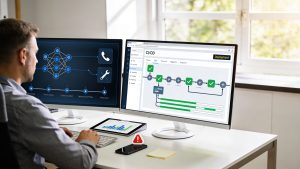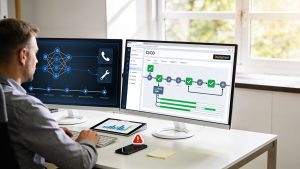DevOps has moved from a technology-focused role to a fundamental driver of enterprise transformation. Organizations are strategically leveraging DevOps to align technology initiatives with broader business goals, leading to measurable gains in revenue, customer satisfaction, and operational efficiency. This evolution positions DevOps as a blueprint for building scalable, resilient, and future-ready digital enterprises.
AI-Driven DevOps: Smarter Operations and Faster Innovation
Artificial intelligence now plays a pivotal role throughout the DevOps lifecycle, introducing automation and intelligence that drastically reduce manual intervention. Modern monitoring platforms analyze millions of events in real time, predict failures, and recommend preventive actions before issues escalate. AI-driven pipelines flag vulnerabilities during code analysis, prioritize testing on high-risk areas, and enable more frequent, reliable releases.
- Continuous code analysis uses AI to spot inefficiencies and security gaps preemptively.
- Testing strategies have shifted to machine-learning-driven prioritization, accelerating release cycles and raising product quality.
- AI-powered incident management ensures issues are identified and resolved proactively, lowering the risk of downtime.
DevSecOps: Security Embedded at Every Step
DevSecOps is transforming the security landscape by making it a non-negotiable core of software development. Security checks and compliance verifications are deeply integrated, with vulnerabilities surfaced early in the pipeline—often right as code is committed. Automated testing and real-time validation help organizations stay compliant with evolving regulations while reducing risk and operational cost.
- Continuous security validation throughout development prevents vulnerabilities from reaching production.
- Automated compliance checks streamline audits and build customer trust in digital platforms.
- Collaborative security practices involving engineering, security, and operations teams foster a genuine security-first culture.
From TechOps to DevOps: Strategic Differences
TechOps traditionally focuses on maintaining uptime and fixing issues reactively. DevOps, in contrast, empowers businesses to anticipate change, automate workflows, and rapidly implement feedback for continuous innovation. As industries integrate IoT, AI, and cloud-native applications, DevOps enables proactive adaptation and business agility, while TechOps remains centered on stability and maintenance.
- DevOps emphasizes continuous delivery and close alignment with business outcomes.
- Proactive monitoring and automated feedback loops improve both operational performance and customer experience.
- Enterprises adopting DevOps frameworks move beyond maintenance mode into a cycle of ongoing growth and transformation.
Advanced CI/CD Pipelines: Intelligence, Security, and Observability
Modern CI/CD pipelines in 2025 have become intelligent, secure, and highly observable. AI-driven testing targets the most vulnerable code areas, while zero-trust security verifies every component and dependency automatically. GitOps methodologies standardize deployments, ensuring environments remain consistent and auditable. End-to-end observability provides comprehensive insights into build quality, deployment health, and end-user impact.
- Automated pipelines enable daily releases and instant response to market shifts.
- Integrated security and compliance minimize operational risk and ensure trustworthy updates.
- Real-time metrics empower teams to identify and resolve performance issues rapidly, turning software delivery into a strategic advantage.
Enterprise DevOps: Sector-Specific Impact
DevOps transformation is tailored for industry-specific needs:
- Financial Services: AI-based monitoring, compliance automation, and secure pipelines drive reliable digital banking and real-time transactions.
- Retail & E-commerce: AI-enhanced load management ensures smooth operations during peak sales periods and rapid product launches.
- Manufacturing & Industry 4.0: Integration of IoT, edge computing, and predictive analytics boosts production efficiency and supply chain agility.
- Telecom & High-Tech: Near-zero downtime deployments for microservices and 5G infrastructure support global-scale innovation.
- Healthcare & Life Sciences: Automated security and compliance pipelines enable fast, safe delivery of regulated digital health solutions.
Final Thoughts
The leading DevOps trends of 2025 make it clear: to achieve rapid innovation, robust security, and enterprise-scale agility, organizations must go beyond legacy TechOps. Embracing AI-powered automation, integrating security through DevSecOps, and investing in advanced CI/CD practices are now essential for sustained business growth and resilience in the digital age.
Read more such articles from our Newsletter here.



